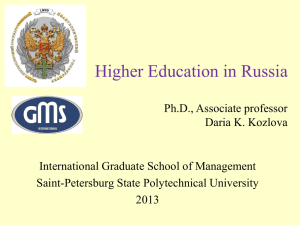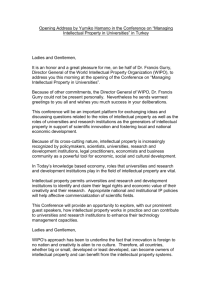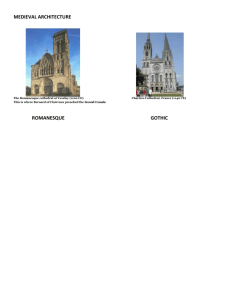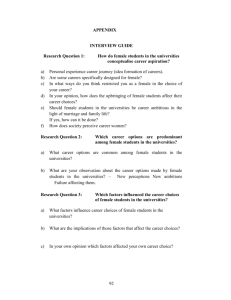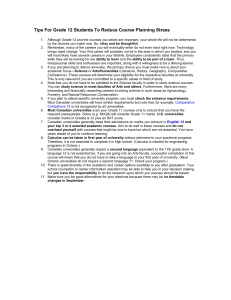The Role of Universities in the Expanding Field of Intellectual
advertisement
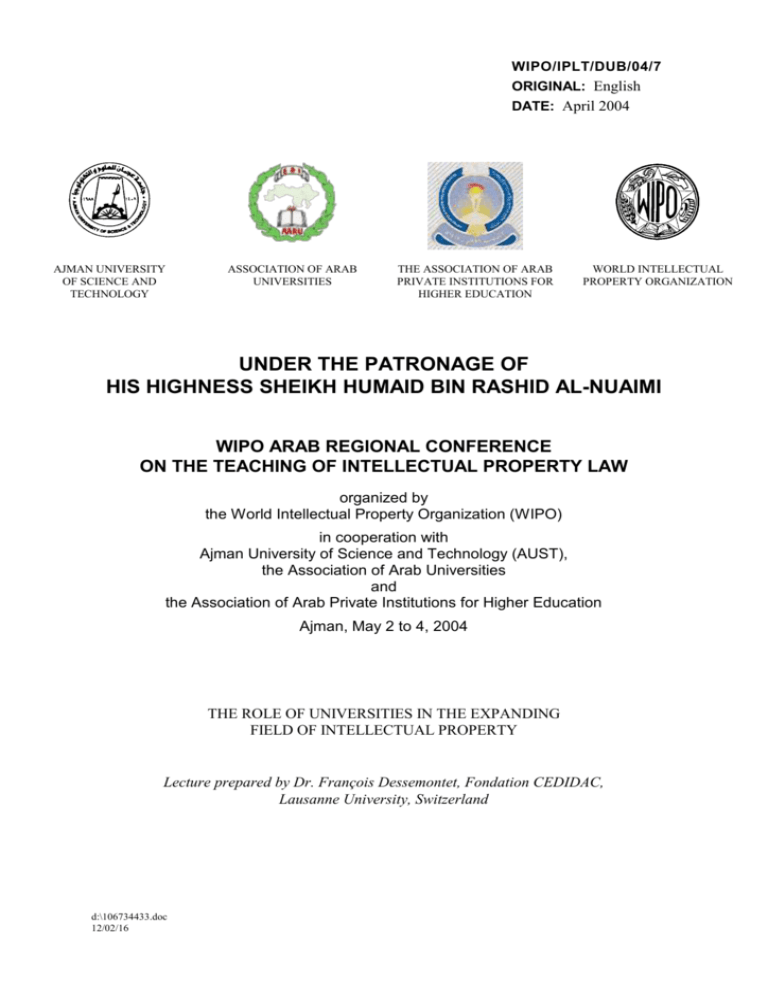
WIPO/IPLT/DUB/04/7 ORIGINAL: English DATE: April 2004 AJMAN UNIVERSITY OF SCIENCE AND TECHNOLOGY ASSOCIATION OF ARAB UNIVERSITIES THE ASSOCIATION OF ARAB PRIVATE INSTITUTIONS FOR HIGHER EDUCATION WORLD INTELLECTUAL PROPERTY ORGANIZATION UNDER THE PATRONAGE OF HIS HIGHNESS SHEIKH HUMAID BIN RASHID AL-NUAIMI WIPO ARAB REGIONAL CONFERENCE ON THE TEACHING OF INTELLECTUAL PROPERTY LAW organized by the World Intellectual Property Organization (WIPO) in cooperation with Ajman University of Science and Technology (AUST), the Association of Arab Universities and the Association of Arab Private Institutions for Higher Education Ajman, May 2 to 4, 2004 THE ROLE OF UNIVERSITIES IN THE EXPANDING FIELD OF INTELLECTUAL PROPERTY Lecture prepared by Dr. François Dessemontet, Fondation CEDIDAC, Lausanne University, Switzerland d:\106734433.doc 12/02/16 WIPO/IPLT/DUB/04/7 page 2 I. INTRODUCTION 1. The Universities have always maintained and developed scientific knowledge. One of the first Buddhist “universities” in Nalanda, near Patna, and the Alexandrine “university” were started with the aim to preserve and to unify Bouddha’s teaching or to allow for the development of literature and mathematics (Alexandria). In both cases universities were conceived as monasteries that were on purpose remotely located or where the scholars would lead a life away from the luxuries and the treacheries of the court (Alexandria). Teaching and researching were interwoven, no one being able to teach what he did not experience itself. 2. The Humboldt University transferred to the State the responsibility for maintaining the University and selecting the teachers, who were in the Middle Age paid by the students and selected by their equals under the aegis of the Church. Already in the XIIth century, however, the graduation process was seen as depending from the Emperor’s powers, which he could delegate to the local potentates, e.g. in Northern Italy. The quality of doctors in law for example was a State matter, as those (very few) legally trained officials would play an important role in the construction of more centralized States. 3. The modern public universities follow more closely the Humboldt model than the Alexandrine model. The University in Western Europe and many more countries in the world is seen as a part of public administration, a sort of higher school, the funds of which are provided by tax payers, and their regulations are in a way very hierarchical. In my own university, there existed ten years ago 11 categories of professors, associated professors, assistant professors, etc., which is typical of an administrative structure. The Council of State still selects the tenured professors (and, formally, the other lecturers down to the assistants). Financial autonomy is not yet perfect. 4. On the contrary, the Anglo-American private university is fully autonomous in its management, and cooperates with the State only by way of research funds that are granted by the State. A variety of patterns have emerged from all over the world that try to turn private universities in profit making institutions, sometimes at the expense of research and publication by the faculty. 5. Now, this dual scheme regulating the university structures is not without importance on the role of universities in the field of intellectual property. On the whole, Stateuniversities are more independent from the economy, that is less prone to react to the needs of the business community, but also more capable of teaching the fundamentals of intellectual property. On the other hand, American style universities are not only professional schools for lawyers, but also nurturing grounds for questions and criticisms against the basic tenets of intellectual property law. We shall revert to this in a moment. 6. At that point in time, suffice it to say that no general statement may adequately mirror the complexities of the varying systems of higher education and the diverging national traditions, e.g. as regards collaboration between the universities and the business community. WIPO/IPLT/DUB/04/7 page 3 7. Therefore, I shall try and address the role of universities in the area of intellectual property, from my own, Continental perspective, with a few side remarks on the U.S. experience. I shall address two issues related to the intellectual property area: (a) What are the real skills of academics? (b) How can they improve dialog with the practitioners, the business community and the State authorities, especially through licensing? II. SKILLS AND EFFICIENCIES What we should do best is our profession: to teach. A. Impartiality 8. To teach well is to teach with impartiality. The very first skill of an academic active in the area of intellectual property is the balance which he tries to strike between the diverging interests within the business community, and between business as a whole and consumers. 9. The whole idea of legal training is to be able to distinguish between facts and law. We know that bad facts do not make good law. We know that wishes for more profitable exclusive rights and extended monopolies do not necessarily further the common wealth of the country, or of the planet. We were able to criticize e.g. the Digital Millennium Copyright Act inasmuch as it may remove from the public domain works that are no longer protected because of the passing of time, but which are effectively accessible only from private data compilation. One of the most interesting cases going on now in European law is the Microsoft case on exhaustion of copyright on software seen as under the abuse of right doctrine. 10. Thus, the professors are able to help the courts and the public administration understand the interests at stake in an objective, independent manner, away from lobbying. This is what is most striking if you compare the ATRIP meetings and those of other professional associations of high standing, such as Association littéraire et artistique internationale (ALAI) and International Association for the Protection of Industrial Property (AIPPI) or the Licensing Executives Society (LES). All the speakers in those distinguished bodies are able to shed a better light on the grounds for and against the extension of intellectual property. However, the general tenor of their recommendation is more often than not an extension of the legal protection. In fact, they have been the moving force behind many improvements and fortunate developments in the most diverse areas of patents, copyrights, trademarks and designs and models. The time may come when we shall need less restraint and less protection, if we do not wish to find ourselves on a maze of regulations stifling economic development as in the Middle Age. B. 11. Alertness To teach well is to teach with passion and curiosity. Thus, the second feature of most IP lecturers strikes me as their alertness to change and to the arising of new needs. It might well be related to the fact that they have to give legal opinions on delicate matters, WIPO/IPLT/DUB/04/7 page 4 highlighting the shortcoming of the legislation. It is also due to their personal interests in the arts or the software, to sum up in the innovative aspects of law. Finally, in some countries around the world, IP professors may have enjoyed the benefits of a technical or scientific training at the undergraduate level. 12. The childish excitement which greets practical demonstration on the Net whenever a lecture addresses the intricacies of e-commerce bears witness to the state of mind which makes for happy lecturers to enthuse their students with novelty. 13. Now, innovations and novelties are hardly in demand in some law faculties, but the alertness to change has brought about a good many IP intensive new academic programs, for example at the postgraduate level. 14. The contrast is striking between the IP academic world of the 70’s, with less than a hundred specialists around the world, and the blooming trade in IP events, with sometimes self-styled specialists in media law, telecommunication law and IP rights. 15. We should therefore foster the development of strong ties between the academic and the business community, so that their specific activities to both be enhanced by the common awareness for innovations and developments of tomorrow. Far from being dusty libraries and offices, intellectual property departments in both University and industry are bright, state of the art breeding grounds for young people with ideas, curiosity, freshness of mind. This leads me to my conclusive remarks on academia generally. C. A Touch for the Future 16. Professor Eike von Hippel, himself son of a professor, once observed that the unborn generations are the forgotten ones in the legislative process. Lobbies and politicians care for everybody but the voters who are not. 17. On the contrary, University professors are by trade directed towards the future, caring for the professionals and scholars of the day after tomorrow. They are able to match the proficiencies of their students and research assistants with those of potential employers. They are also eager to help young people find their way in the maze of methodologies, interests, ideologies and life models that are offered nowadays on a global scale. Let us think for instance of the advice always requested for choosing valuable internships or postgraduate programs abroad, or for doctorate thesis. 18. Therefore, I may here open to you my one and only suggestion of change for universities: we should encourage by appropriate measures the joining of young members in the universities staff. Contacts should be encouraged by universities with offices and industry accepting interns and first-job applicants. 19. Let me turn now to that second, most important topic: how can the universities join efforts with the world of practitioners, the business community and the State authorities. WIPO/IPLT/DUB/04/7 page 5 III. FURTHERING DIALOG A. 20. The University has much to contribute to the common welfare. Welfare is, however, the result of many activities, most of which are carried forth by people outside academia. How can those people be reached by the scholars? My intimate persuasion is that scholars have to initiate the preparatory steps towards an increased dialog, and this for a variety of reasons. First, they know what they can offer. Second, they know better than the business community to what extent the increased autonomy of the law schools and universities give them a freedom of action in the consulting business. Finally, scholars have to show their creativity more by action than by words. B. 21. The initiative The General Scheme Individual professors and IP departments have at the onset little financial means to attract the interests of the practitioners. Thus, an absolute must is to reinvest in an autonomous entity whatever previous activities of the department may have brought in as income or compensation. Continuing legal education programs are a good way to start. For example, if a new law on patents, copyrights or trademarks has been passed by the legislature, the opportunity to bring it close to the practitioners against sufficient compensation should not be missed. For instance the CEDIDAC (Center for Business Law of the University of Lausanne), which is active not only in IP matters, has organized more than 60 continuing legal education programs in 20 years, with a global attendance of nearly 15’000 participants. This has given the financial strength necessary to pay the printer’s bills and publish 56 books (and more are coming). 22. By the same token, the ability to have our own resources has made the Center independent towards the companies that were requested to help (about 40 doing it on a subscription basis). In spite of their generosity, those companies were never tempted to misuse their sponsorship in order to impose a speaker or a topic. Early experience has shown that a majority of professors in the consulting body or executive committee is a safe measure against any undue influence by the industry representatives. 23. Reaching out towards industry is not our only goal. As the Center is here to serve the interests of practicing lawyers and in-house counsel, we devised a fan club which now comprises one thousand members. Their modest dues (unchanged since 1985) help balance the budget, but more importantly, they provide us with a public and readers. Without the aim to assist them render a better justice because they better know the laws, none of our authors, lecturers, assistant or clerical help would work as intensively as they do. WIPO/IPLT/DUB/04/7 page 6 24. At a time of ceaseless changes, a newsletter is a good idea to show that University professors and assistants are knowledgeable in their field. It may be a heavy burden to follow the new cases and the publications of our colleagues, but are we not supposed to do it already for our students? 25. Finally, the IP law professors may help their colleagues from other departments when negotiating consulting agreements with the industry. In fact, the transfer of technology from university to industry is becoming a hot topic. ATRIP worked on that in the 80’s already, and it has been staple subject matter at most of our meetings. Particular care is to be exercised when working as professionals. IV. CONCLUSION 26. Independence of mind is the key to the success of the universities in tomorrow’s world, as it has been since the foundation of the Bologna University, 800 years ago. At a time where the hardware and the technical software exceed by far the wildest imaginations, creativity in the arts and sciences is required for checking media moguls and software emperors. We, as professors, are ones among the many agents of controlled change and better social adequation of the technology to the true needs of the Society. ***** [End of document]
